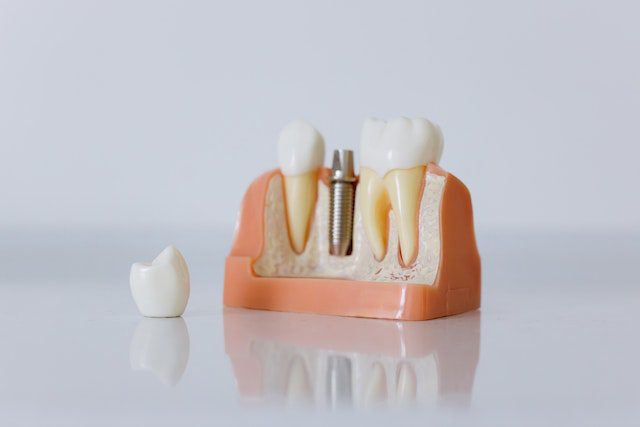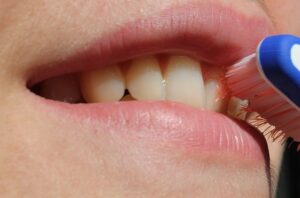A dental implant is a surgical fixture inserted into the jawbone, where it gradually merges with the bone over several months. This implant functions as a substitute for the missing tooth’s root, providing a foundation for a replacement tooth or bridge. Despite advancements in dental care, many people continue to experience tooth loss, primarily caused by decay, injury, or periodontal issues. In the past, bridges and dentures stood as the sole remedies for individuals with broken or missing teeth, but dental implants have now gained popularity.
In this article, we will discuss the primary reasons why dental implants may be your best bet for replacing missing teeth.
Table of Contents
Benefits of Dental Implants
Opting for a dental implant for tooth replacement offers several notable advantages in comparison to alternative choices. Here are some of its advantages:
1. Prevention of Bone Deterioration
Your natural teeth are situated within the jawbone and are prompted by biting or chewing, which provides stimulation. However, in the absence of teeth, the section of the jawbone that supports teeth (known as the alveolar bone) lacks the necessary stimulation. This causes it to deteriorate. Dental implants stand as the exclusive option for tooth replacement, capable of restoring this stimulation and preventing bone loss.
2. Seamless Integration with Natural Teeth
Dental implants are available in various sizes and shapes. This makes it impossible for anyone to discern which teeth are actually implants.
3. Effective Restoration of Chewing Strength
Through a distinct titanium post that substitutes the tooth root and is anchored into the jawbone, dental implants ensure the restoration of bite force. This permits you to exert a comparable level of biting strength as you would with your original teeth. In contrast, other methods of tooth replacement, which rest on the gum’s surface without being anchored, fail to achieve this level of bite force restoration.
4. Prevention of Facial Shape Alterations
The teeth play a pivotal role in upholding facial length and the structure of the jawbone. Tooth loss can impact your facial contours and contribute to an aged appearance. However, dental implants provide the same level of facial support as natural teeth, effectively preventing any distortion in your facial features.
5. Restoration of Natural Speech Patterns
Certain tooth replacement choices, like dentures, might impede your capacity to enunciate words accurately. Additionally, missing teeth can modify your speech. Dental implants function akin to natural teeth, facilitating effortless and authentic speech.
6. Simplified Upkeep
Implants do not necessitate the purchase of exclusive products like specialized flossers, cleaning solutions, or tablets to maintain their cleanliness and condition. Simply brushing and flossing them akin to your original teeth is sufficient.
7. Secure Fit Without Movement
Denture users often grapple with self-consciousness while laughing, eating, or speaking in public, as dentures can visibly shift or move within the mouth. In contrast, dental implants are securely anchored, eliminating any potential for embarrassment.
8. Support for Adjacent Teeth
The vacancy left by a missing tooth in the mouth can lead to neighboring teeth shifting, causing misalignment. Dental implants fill this gap, ensuring the maintenance of proper teeth alignment.
9. Long-Lasting Solution to Tooth Loss
Unlike other tooth replacement alternatives that might necessitate frequent repairs or replacements, dental implants are designed for permanent longevity.
What are the potential issues associated with dental implants?
As with any surgical procedure, there are certain risks and possible complications that pertain to the patient’s well-being and the overall success of a dental implant. This is why meticulous preoperative assessment is crucial to confirm the patient’s suitability for oral surgery and to facilitate proper healing.
Similar to other oral surgery interventions, it’s important to thoroughly evaluate the patient before proceeding with treatment. This may include checking for bleeding disorders, infections, allergies, existing medical conditions, and medications.
Regardless, the rate of success is notably high, and instances of failure generally arise only where there are:
- An infection
- Dental implant fracture
- Excessive load on the implant
- Harm to the surrounding region (nerves, blood vessels, adjacent teeth)
- Improper positioning of the implant
- Inadequate bone quantity or quality.
Strategic planning and opting for a skilled dentist like those at Dentakay Dental Clinic can aid in mitigating these challenges. Many times, if a dental implant fails, a subsequent attempt can be made to replace it once the requisite healing period has transpired. There’s no cause for alarm.
Is dental implant surgery painful?
Typically, dental implant surgery is conducted with local anesthesia, ensuring the absence of pain during the procedure. After the numbing effect of the anesthesia subsides, post-surgery discomfort varies based on individual cases. Generally, most individuals experience discomfort akin to that of a tooth extraction.
Immediately following the procedure, a cold ice pack is applied to the skin above the surgical site to minimize swelling. This pain can usually be managed with non-prescription pain relievers like ibuprofen (Advil) or acetaminophen (Tylenol). For more extensive surgery, a stronger prescription pain medication might be necessary, and the recovery period might be longer.
Apart from pain medications, antibiotics, and oral rinses could be prescribed to support the healing process in the weeks that follow.
What post-implant care is required?
Following a dental implant procedure, there’s a potential risk of developing “peri-implantitis,” comparable to gum disease in natural teeth. This inflammation affects the gum and bone surrounding the implant, often caused by excessive biting forces or bacterial infection. If untreated, it can lead to implant failure.
To avert this, regular maintenance, both at home and at the dental clinic, is crucial. At home, maintaining good oral hygiene involves routine brushing and flossing to eliminate food particles and plaque.
At our clinic, specialized tools are used to examine the nearby soft and hard tissues. These tools help remove calcified deposits around the implant. Adjustments to the bite may also be made to ensure that the implant isn’t subjected to excessive biting forces. This comprehensive approach aids in the prevention of complications and supports the long-term success of the dental implant.
In all, continuous advancements in technology and science have significantly enhanced the success rates of dental implant procedures. Presently, the achievement rate of dental implants is nearly 98%. This means you have a high likelihood of having no complications at all if you’re considering getting dental implants. On that note, book a consultation with us to get started!
Featured Photo by cottonbro studio: https://www.pexels.com




